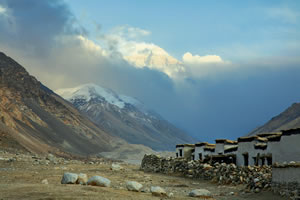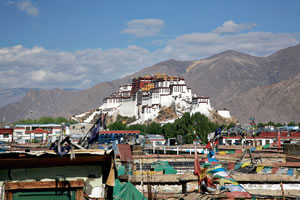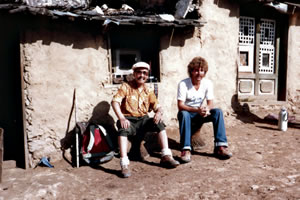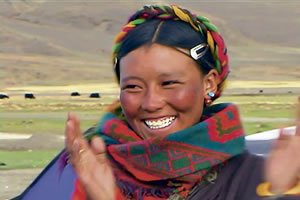Hearing The Call Of The Mountains

A view of Mount Everest
Two Hawaii men, fascinated by the land of the Himalayas, create a powerful film about Tibet, Nepal and Bhutan that plays here Nov. 12
Common sense and science kind of put a damper on things like magic and mystery notions we give up around the time we learn the truth about the Tooth Fairy. That’s what makes a chat with Maui filmmakers Dr. Tom Vendetti and Robert Stone so refreshing. Spend a little time with them, or better yet check out their latest film When the Mountain Calls: Nepal, Tibet & Bhutan, and you’ll feel subtle stirrings of excitement. Suddenly the known and the mundane give way to the promise of adventure and possibility.
Vendetti, a psychologist, began his foray into filmmaking in 1985 with a feature called Therapy on the River. The documentary chronicled a rafting trip that Vendetti took down the San Juan River in Utah with a group of his seriously mentally ill patients. The idea was to decrease the stigma attached to being mentally ill.
“That was the first film I ever made and it ended up on local television,” he says. “After that I was hooked because it was such a powerful way to share my experience.”
More than 25 years later, his passion for filmmaking has translated into at least a dozen films and an Emmy Award. And his love affair with nature continues. It’s the majestic terrain of the Himalayan foothills the colorful Buddhist monasteries perched against cliffs; women and children, farmers and monks going about their daily activities as they might have hundreds of years ago that keep calling to Vendetti and his camera.

Potala Palace in Lhasa, Tibet
When the Mountain Calls borrows footage from those previously released films, tied together with footage from his most recent 2009 journey to the lands that bask in the presence of the world’s highest peak.
“Originally it was supposed to be a film on climate change in the Himalayan region,” says Vendetti, “but then I was diagnosed with cancer.”
Curative treatment left him weak, but where most people might stay in bed to recover, Vendetti felt the Himalayas beckoning. His short film on climate change turned into a feature film.
“Tom’s other films were a little more focused on his journey to Tibet or Bhutan and what happened in that area with that particular trip,” notes the film’s editor and co-producer Stone, who also directed the popular
Taylor Camp last year (about a 1970s hippie commune in Kauai). “This film is different in that it sort of steps back and takes a bigger look at his journey over the last 30 years.”
It’s hard to describe Vendetti’s experiences as anything short of magical. Inclement weather, the unforgiving kind that takes lives in those freezing climes, turns uncharacteristically calm and clear. Despite warnings about roads that have been closed for some time, roads that call for a days-long trip through a mountain pass, Vendetti presses on and by the time he arrives, serendipitously the roads have opened.

Tenzing Norgay and Tom Vendetti. Photos from Blaise Noto
At one point Vendetti gets an obsession with arranging for multiple Grammy-winning musician Paul Horn to play his flute in the halls of the striking Potala Palace in Lhasa, Tibet. Against all odds, that dream materializes.
There’s a chickenskin moment where Vendetti is descending from a trip to the glaciers. He arrives at a village lodge and the manager of the place asks his name.
“I told the manager my name and he said he had pictures of me that went back to 1983,” says Vendetti. “He hadn’t looked through them in 20 years. He actually pulled them out the day that I arrived. The next day here I am talking to him and he’s showing me pictures, and it just brought me to tears.”
The manager’s father had taken the pictures all those years ago. They were of Vendetti with the legendary Tenzing Norgay, one of the first two people ever to summit Everest. In 1983 while traveling to the Everest base camp, Vendetti discovered that his happenstance travel companion was Norgay, on his way to reunite with Sir Edmund Hillary, marking the 30year anniversary of their historic summit. Vendetti was invited to the momentous celebration as Norgay’s special guest.
These unexpected moments pop up like little gems throughout the movie.
“Tom’s approach to filmmaking is not forced, it’s not planned,” says Stone. “He has a willingness and an innocence to capture what happens, and because of that he creates the space for magical things to happen.”

Tibetan mountain woman
Vendetti chuckles about the coincidences: “That was one of my problems being in academia for so long, doing master’s theses and a dissertation, and also working with the seriously mentally ill I’m always trying to ground people when they’re psychotic or ‘not in touch with reality.’ I’m always the one who had to be objective. But with this last trip, I kind of surrendered to just being ‘in love with the mystery’ of it all, as Ann Mortifee (the film’s narrator) says.”
Stone describes the film’s impact and also makes reference to Mortifee: “I don’t know how many dozens or hundreds of times I’ve seen this film,” he says, “and I think this has to do with the writing and with Ann’s narration, but there are still places when I watch through it that I’m on the verge of tears because of the words and because I know a bit of the backstory.”
His hope for the audience is that they open themselves to life’s “wonderful synchronicities.” Vendetti has another way of putting it: “‘The mountain’ can mean different things for different people,” he says, “but when the mountain calls, show up.”
Vendetti and Stone, along with Mortifee and Horn, will be present at the upcoming world premiere of When the Mountain Calls.
The film plays at Kaua’i Community College Performing Arts Center at 7 p.m. Nov. 12. Preceding the screening, Ann Mortifee will read passages from her new book, “In Love With the Mystery,” accompanied by her husband, world-renowned musician, Paul Horn, on flute. Tickets cost $20 each and can be purchased at ticketderby.com. For more information, visit whenthemountaincalls.com.



